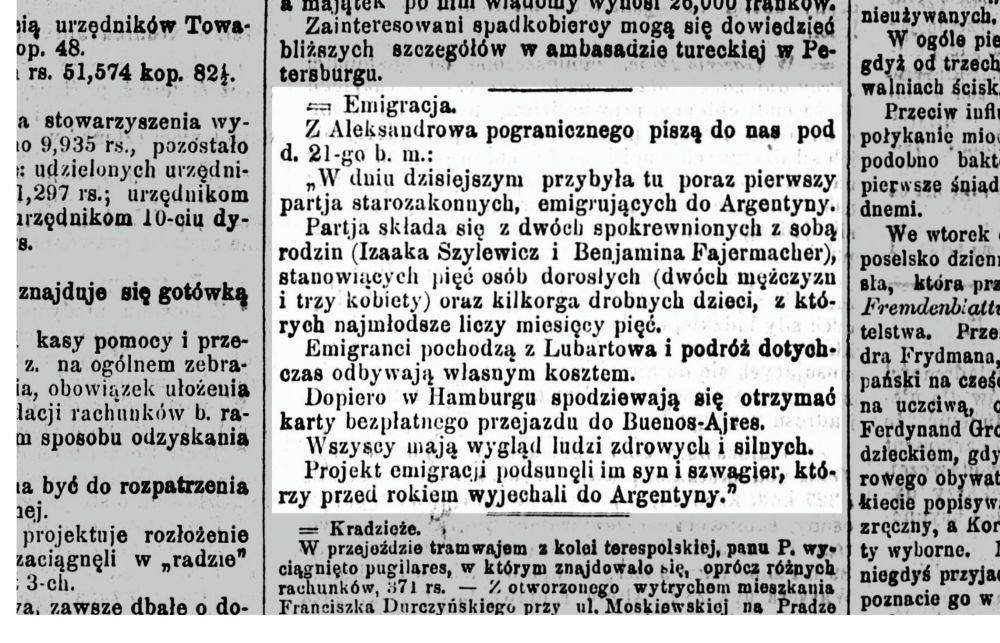- News
- Events
- Oneg Shabbat
- Collections
- Research
- Exhibitions
- Education
- Publishing Department
- Genealogy
- About the Institute
- Bookstore


"Kurier Warszawski" from 23 January 1892. Note on migrants Icchak Jakob Szylewicz and Benjamin Papiermacher. Polona
In late 1891, Baron Maurice de Hirsch negotiated the purchase of vast land areas in Northern Argentina to settle them with Jewish immigrants from Russia. The following year, planning began for new Jewish settlements. Rumors of the Baron’s plans quickly reached Europe. Reports began appearing in newspapers about a mysterious emissary of the Baron visiting towns and cities to recruit potential candidates for settlement.
In January 1892, two men with their families crossed the border from the Russian Empire to Prussia at the Służewo border crossing in Polish Kujawy region. They were on their way to Hamburg, where they were to sail off to Argentina. A reporter for “HaTzfira” newspaper noted that the men were Icchak Jakob Szylewicz and Benjamin Papiermacher from Lubartów, near Lublin.
![akt_urodzenia_pytla_cut.jpg [481.93 KB]](https://www.jhi.pl/storage/image/core_files/2022/2/25/e3ee8e96e7387e3e58f1989ad9d90e8e/jpg/jhi/preview/akt_urodzenia_pytla_cut.jpg)
What led these two men to leave their hometown and go on such a long and risky trip to the other side of the world? Perhaps the reason lies in dramatic events that took place more than a decade earlier.
In the spring of 1879, a body of a young woman was found by the river Wieprza, some half a mile away from the village of Leszkowice in the Lubartów region. Her hands were tied up, and she had a rope tied around her neck. A doctor found the cause of death to be strangulation. The young woman was identified as Józefa Witkowska, the wife of Antoni Witkowski, a farmer, who disappeared without a trace two months earlier from the village of Wesołówka.
![WITKOWSKI Antoni - KATZHANDEL Józefa, M1878 Lublin św Jana.jpg [1.41 MB]](https://www.jhi.pl/storage/image/core_files/2022/2/25/ee04fd972a2107bf9cd6f31f7123735f/jpg/jhi/preview/WITKOWSKI%20Antoni%20-%20KATZHANDEL%20Józefa,%20M1878%20Lublin%20św%20Jana.jpg)
Antoni first encountered Józefa a year earlier in the neighboring village of Zakrzów (Łęczna region), where they were both living at the time. Antoni was a young farmer, and Józefa, then known as Pytla Katzhandel, was the daughter of Jewish farmers. Józef and Pytla fell in love and wanted to marry, yet Pytla’s family objected strongly and forcibly.
Pytla and Antoni ran away to Lublin, where Pytla was baptized, and the couple married at the St. John Cathedral. However, this did not mean the end of their problems as one can imagine. Once back in Zakrzów, they lived with Antoni’s family, but Pytla’s family was unwilling to accept her choice. They continued harassing and threatening the Witkowskis and, at one point, set fire to their home.
![Nawa_główna_w_lubelskiej_Archikatedrze_Tomasz Zugaj_wiki_gnu_1.2..jpg [267.73 KB]](https://www.jhi.pl/storage/image/core_files/2022/2/25/394dffa53d49e91bceeccc4d6a431ef4/jpg/jhi/preview/Nawa_główna_w_lubelskiej_Archikatedrze_Tomasz%20Zugaj_wiki_gnu_1.2..jpg)
Tired of the constant harassment, the young couple left Zakrzów and moved to another village – Wesołówka, but the trouble did not stop. Pytla’s family was determined to break up the marriage no matter what it took. In December 1878, Pytla’s brother and two other men showed up in Wesołówka and kidnapped Pytla. They took her to the fortress town of Dęblin (at the time Iwangoród) and kept her there against her will for a certain period of time. There are several versions as to what happened after they left the town. Another two months passed before Pytla’s body was found.
A lengthy investigation revealed all that is described above, and in 1880, a high-profile trial was held at the Lublin district court. The defendants were Szejwa Katzhandel, Pytla’s mother, Abraham Katzhandel, her brother, Jankiel Szylewicz and Chaja Hochman, relatives of the family, accused of murder in the name of religious fanaticism, and Abraham Hochman, Pytla’s half-brother, accused of knowing about the plans to murder his sister and taking part in the kidnapping.
67 witnesses testified over three days, after which the court found Jankiel Szylewicz guilty of the murder and Abram Katzhandel guilty of being aware of the events and not preventing them. Szylewicz was sentenced to 11 years of hard labor in Siberia. Katzhandel was sentenced to two years in jail. The other defendants were acquitted.
![WITKOWSKI Antoni - KATZHANDEL Józefa, M1878 Lublin św Jana.jpg [1.41 MB]](https://www.jhi.pl/storage/image/core_files/2022/2/25/ee04fd972a2107bf9cd6f31f7123735f/jpg/jhi/preview/WITKOWSKI%20Antoni%20-%20KATZHANDEL%20Józefa,%20M1878%20Lublin%20św%20Jana.jpg)
We cannot be sure what exactly happened during that winter of 1878. We also don’t know much about the events following the trial. Antoni Witkowski, then a widower in his early twenties, resettled in another village, where he remarried, had children, and perhaps found some peace. Abram Katzhandel died several years after the trial. In the winter of 1891/1892, Jankiel Szylewicz and his companion Benjamin crossed the border to Prussia, where they reached Hamburg. Despite earlier plans to sail to Argentina, they eventually boarded the SS Sorrento, which reached Ellis Island – the place where most of immigrants to the USA came – in early 1893, and the family settled in Bayonne, NJ. Jankiel Szylewicz lived for another 30 years. He died in Bayonne in 1923, thousands of kilometers away from Zakrzów, where Pytla Katzhandel and Antoni Witkowski first met several decades earlier.